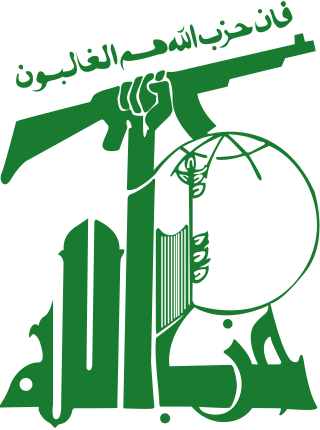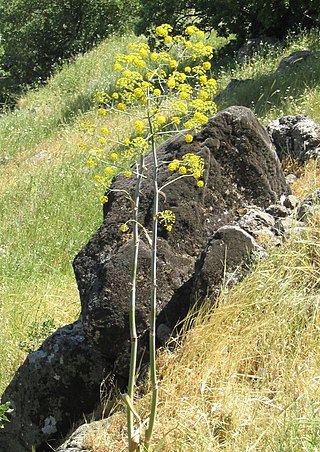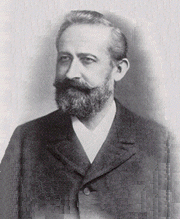
Hezbollah is a Lebanese Shia Islamist political party and paramilitary group, led since 1992 by its Secretary-General Hassan Nasrallah. Hezbollah's paramilitary wing is the Jihad Council, and its political wing is the Loyalty to the Resistance Bloc party in the Lebanese Parliament. Its armed strength is assessed to be equivalent to that of a medium-sized army.

Lebanon, officially the Republic of Lebanon, is a country in the Levant region of West Asia. It is bordered by Syria to the north and east, by Israel to the south, and by the Mediterranean Sea to the west; Cyprus lies a short distance away from the country's coastline. Lebanon is located at the crossroads of the Mediterranean Basin and the Arabian hinterlands. Lebanon has a population of more than five million people and covers an area of 10,452 square kilometres (4,036 sq mi). Beirut is the country's capital and largest city.

Beirut is the capital and largest city of Lebanon. As of 2014, Greater Beirut has a population of 2.5 million, which makes it the third-largest city in the Levant region and the thirteenth-largest in the Arab world. The city is situated on a peninsula at the midpoint of Lebanon's Mediterranean coast. Beirut has been inhabited for more than 5,000 years, making it one of the oldest cities in the world.

Asafoetida is the dried latex exuded from the rhizome or tap root of several species of Ferula, perennial herbs of the carrot family. It is produced in Iran, Afghanistan, Central Asia, northern India, and Northwest China (Xinjiang). Different regions have different botanical sources.

The Shebaa Farms, also spelled Sheba'a Farms, also known as Mount Dov, is a small strip of land at the intersection of the Lebanese–Syrian border and the Israeli-occupied Golan Heights. The territory is named for the farms within it which were historically tended by the inhabitants of the Lebanese town of Shebaa. It is about 11 kilometres (7 mi) long and 2.5 kilometres (2 mi) wide.

Bashar al-Assad is a Syrian politician who is the current and 19th president of Syria since 17 July 2000. In addition, he is the commander-in-chief of the Syrian Armed Forces and the secretary-general of the Central Command of the Arab Socialist Ba'ath Party, which nominally espouses a neo-Ba'athist ideology. His father and predecessor was General Hafiz al-Assad, whose presidency in 1971–2000 marked the transfiguration of Syria from a republican state into a de facto dynastic dictatorship, tightly controlled by an Alawite-dominated elite composed of the armed forces and the Mukhabarat, who are loyal to the al-Assad family.

Ferula is a genus of about 220 species of flowering plants in the family Apiaceae, native to the Mediterranean region east to central Asia, mostly growing in arid climates. Many plants of this genus, especially F. communis, are referred to as "giant fennel," although they are not fennel in the strict sense.

Walid Kamal Jumblatt is a Lebanese politician who was the leader of the Progressive Socialist Party from 1977 until 2023. A Druze and former militia commander, Jumblatt led the Lebanese National Resistance Front and allied with the Amal Movement during the Lebanese Civil War. He worked closely with Suleiman Frangieh to oppose Amine Gemayel's rule as president in 1983. After the civil war, he initially supported Syria but later led an anti-Assad stance during the start of the Syrian Civil War. He is still active in politics, most recently leading his party, the Progressive Socialist Party (PSP) in the 2022 Lebanese general election.

Syria, officially the Syrian Arab Republic, is a country in West Asia located in the Eastern Mediterranean and the Levant. It is bounded by the Mediterranean Sea to the west, Turkey to the north, Iraq to the east and southeast, Jordan to the south, and Israel and Lebanon to the southwest. It is a republic that consists of 14 governorates (subdivisions). A country of fertile plains, high mountains, and deserts, Syria is home to diverse ethnic and religious groups, including the majority Arabs, Kurds, Turkmens, Assyrians, Circassians, Armenians, Albanians, Greeks, and Chechens. Religious groups include Sunnis, Christians, Alawites, and Druze. The capital and largest city is Damascus. Arabs are the largest ethnic group, and Sunni Muslims are the largest religious group. Syria is now the only country that is governed by Ba'athists, who advocate Arab socialism and Arab nationalism.

Heinrich Carl Haussknecht was a German pharmacist and botanical collector who was a native of Bennungen, Sachsen-Anhalt.

Ferula tingitana, the giant Tangier fennel, is a species of the Apiaceae genus Ferula. Despite the name, the plant is not a type of fennel proper, which belongs to another genus (Foeniculum).
Refugees of the Syrian civil war are citizens and permanent residents of Syria who have fled the country throughout the Syrian civil war. The pre-war population of the Syrian Arab Republic was estimated at 22 million (2017), including permanent residents. Of that number, the United Nations (UN) identified 13.5 million (2016) as displaced persons, requiring humanitarian assistance. Of these, since the start of the Syrian civil war in 2011 more than six million (2016) were internally displaced, and around five million (2016) had crossed into other countries, seeking asylum or placed in Syrian refugee camps worldwide. It is often described as one of the largest refugee crises in history.
Agapanthia angelicae is a species of longhorn beetle in the subfamily Lamiinae, found in Central Asia and Iran. The species is 12–18 millimetres (0.47–0.71 in) long and is black coloured. Adults are on wing from May to June. They feed on Ferula hermonis.

Between 2011 and 2017, fighting from the Syrian civil war spilled over into Lebanon as opponents and supporters of the Syrian Arab Republic traveled to Lebanon to fight and attack each other on Lebanese soil. The Syrian conflict stoked a resurgence of sectarian violence in Lebanon, with many of Lebanon's Sunni Muslims supporting the rebels in Syria, while many of Lebanon's Shi'a Muslims supporting the Ba'athist government of Bashar Al-Assad, whose Alawite minority is usually described as a heterodox offshoot of Shi'ism. Killings, unrest and sectarian kidnappings across Lebanon resulted.

The Iran–Israel proxy conflict, also known as the Iran–Israel proxy war or Iran–Israel Cold War, is an ongoing proxy conflict between Iran and Israel. In the Israeli–Lebanese conflict, Iran has supported Lebanese Shia militias, most notably Hezbollah. In the Israeli-Palestinian conflict, Iran has backed Palestinian groups such as Hamas. Israel has supported Iranian rebels, such as the People's Mujahedin of Iran, conducted airstrikes against Iranian allies in Syria and assassinated Iranian nuclear scientists. In 2018 Israeli forces directly attacked Iranian forces in Syria.
The Lebanese–Syrian border clashes were a series of clashes on the Lebanon–Syria border caused by the ongoing Syrian Civil War.

Ligusticopsis wallichiana is a species of flowering plant in the family Apiaceae. In cultivation, it has been known by the synonym Selinum wallichianum.

Following the outbreak of the protests of Syrian revolution during the Arab Spring in 2011 and the escalation of the ensuing conflict into a full-scale civil war by mid-2012, the Syrian Civil War became a theatre of proxy warfare between various regional powers such as Turkey and Iran. Spillover of the Syrian civil war into the wider region began when the Iraqi insurgent group known as the Islamic State of Iraq (ISI) started intervening in the conflict from 2012.

Hezbollah involvement in the Syrian Civil War has been substantial since the beginning of armed insurgency phase of the Syrian Civil War in 2011, and evolved into active support for Ba'athist government forces and troop deployment from 2012 onwards. By 2014, Hezbollah was deployed across Syria. Hezbollah has also been very active in preventing Al-Nusra Front and Islamic State penetration into Lebanon, being one of the most active forces in the Syrian Civil War spillover in Lebanon.

The Qalamoun offensive was an offensive led by the Iranian-backed militia Hezbollah, supported by the Syrian Army, during the Syrian Civil War, against the al-Nusra Front and other Syrian opposition forces entrenched in the mountains of the Qalamoun region.















